The Growing Problem
The recovery-relapse cycle of addiction and substance use is painful for so many. Individuals and their families are drained of precious time, energy, resources, finances, and hope forever finding a way out. Brain-based addiction recovery alternatives are becoming an increasingly popular and effective way to enhance more traditional interventions. There has never been a more important time for change as the statistics surrounding addiction and the vast increase in the number of treatment facilities nationwide paint a very grim picture.
The Difference
Traditional addiction and substance use recovery programs have remained largely unchanged since 1935 when Alcoholics Anonymous was founded. This marked the beginning of the 12-Step model of recovery and the view of addiction as a disease. This disease model utilizes necessary detoxification from the substance or habit, medication to curb unwanted behavior, intensive counseling to address previous trauma that may have led to addiction, and a focus on the tenets of the 12-Step program; the first of which is admitting powerlessness over the substance or behavior one seeks to eliminate.
Brain-based approaches to recovery address what many in the psychological and neurosciences believe is the root cause of addiction; Learning and Behavioral Disorders. Whether primary or related to conditions like a brain injury. The following conditions are classically associated with those seeking treatment for addiction and substance use disorders of any type:
PTSDConcussion/Brain injury/StrokeADHD/OCD/ODDAuditory/Language processing disorderDyslexia/Dyscalculia/DysgraphiaNon-verbal learning disabilities/Asperger’sVisual perception disorder/Eye movement disorderMotor disabilities – dyspraxia, ataxia, CP, stroke, etc.Cognitive disorders – executive function, memory, processing speed, etc.Vestibular (balance) disordersRead More at Apex Brain Centers


